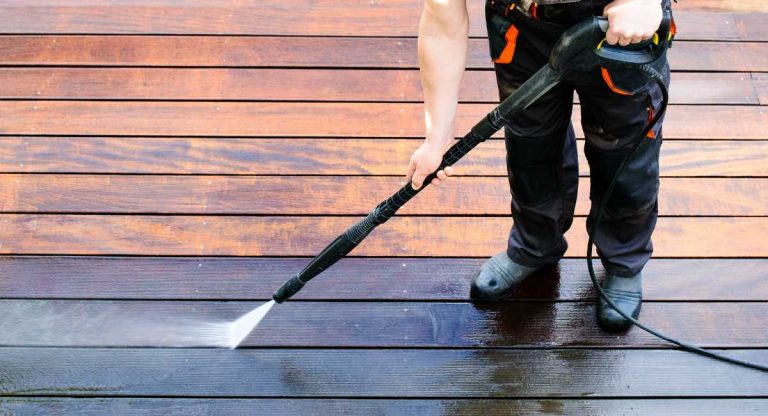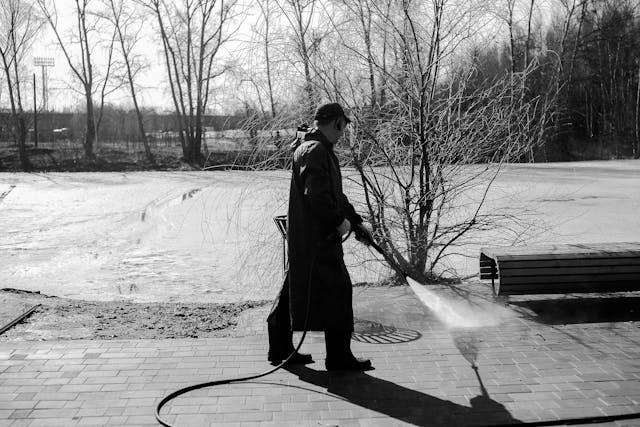
Power washing isn’t just for single-family homes. If you’re managing a multi-family property, apartment complex, or part of a homeowners association (HOA), regular power washing is a must to keep the community looking clean, well-kept, and inviting. 🧼✨
But hiring a power washing service for a shared or multi-unit property comes with its own unique challenges — from scheduling logistics to community expectations and safety concerns. Let’s break down what you need to know before hiring a contractor to handle the job. 🧾📋
🏘️ Why Power Washing Is Essential for Shared Properties
Multi-family buildings and HOA communities get a lot of wear and tear. Dirt, mold, mildew, oil stains, and grime build up quickly in high-traffic areas like:
- Breezeways
- Staircases
- Sidewalks
- Entryways
- Parking lots
- Siding on large buildings
- Fences and walls
- Clubhouses and pools
Professional power washing can make these areas look new again, improve resident satisfaction, and even increase property value. It’s not just cosmetic — it’s a practical investment. 💰🏠
📆 Timing and Frequency: When Should You Schedule?
For HOAs and multi-unit buildings, most managers schedule power washing:
- Once or twice a year (spring and fall are ideal)
- Before inspections or open houses
- After storms or construction projects
- Before events like summer BBQs or holiday celebrations
Keeping a regular schedule helps prevent buildup and reduces the need for deep, more expensive cleanings. ⏳💡
📋 What to Include in the Scope of Work
Before hiring a service, clearly define what areas you want cleaned. For larger properties, the scope might include:
- All siding on buildings
- Entryways and stairwells
- Walkways and concrete pads
- Pool decks and common areas
- Trash enclosures or dumpster areas
- Perimeter walls or fences
- Signage and monuments
🧠 Tip: Walk the property and make a list. Take photos if possible. This will help the contractor provide an accurate quote and avoid confusion later.
🧾 What to Ask When Hiring a Power Washing Company
Multi-family or HOA work is more complex than residential jobs. Make sure the contractor is experienced with large-scale or commercial jobs. Ask:
- “Have you worked with HOAs or apartment buildings before?”
- “Can you provide references from other property managers?”
- “Do you carry commercial liability and workers’ compensation insurance?”
- “Do you have experience with multi-day or phased projects?”
- “Can you provide a detailed quote with line items for each section?”
Make sure the company uses proper equipment and has enough staff to complete the job efficiently. 🧑🔧🧼
📣 Notify Residents in Advance
Power washing can be noisy, wet, and disruptive — especially in shared spaces. Before the service day, send out a community notice with:
- The date(s) and time window
- Areas that will be inaccessible
- Parking restrictions, if any
- Instructions for removing personal items (e.g. bikes, plants, furniture)
- Warnings about water runoff or noise
📢 Communication = happy residents (and fewer complaints).
Browse Amazon Here For Commercial Pressure Washers And Accessories
🚧 Safety and Liability Considerations
Power washing crews working on tall buildings or tight walkways can be a safety risk if not handled properly. Always confirm:
- They’re using safety harnesses and cones/signs
- Walkways will be blocked off during washing
- Wet surfaces will be marked or dried quickly
- Parking areas are protected or taped off
Your liability increases with shared spaces, so make sure the contractor has the right insurance coverage. Ask for proof — and keep it on file. 📂
🧽 Soft Wash vs. High Pressure
For large buildings, a soft wash method is often preferred, especially for:
- Vinyl siding
- Painted surfaces
- Stucco
- Older structures
Soft washing uses low pressure and specialized cleaning solutions to remove dirt without damage. High-pressure washing may still be appropriate for:
- Concrete
- Brick
- Stone
- Dumpster pads or heavily stained areas
Ask the contractor to explain which method they recommend for each surface. The right approach will protect your property and extend its lifespan. ✅
💰 Budgeting and Cost Breakdown
Pricing varies by region, square footage, and complexity, but for multi-unit or HOA work, you might expect:
- $0.20–$0.50 per square foot for flat work (sidewalks, driveways)
- $250–$600 per building for siding
- $1,000+ for full-property jobs or multi-day projects
Get multiple bids if possible — but be wary of low-ball offers. Quality, insurance, and experience are worth paying for in this scenario. 💸
Also ask:
“Do you offer HOA or commercial maintenance contracts?”
Some companies offer discounted rates for quarterly or biannual service agreements.
📊 Tracking and Feedback
After the job is done, inspect the work or request a walkthrough with the contractor. Ask for:
- Before and after photos
- A service summary
- Any recommendations for future maintenance
Consider creating a short resident survey to gather feedback and improve the process next time. 📈🗣️
🏁 Final Thoughts
Keeping shared spaces clean is about more than just appearance — it’s about community pride, safety, and long-term value. By hiring the right power washing service for your multi-family or HOA property, you’ll protect your investment and keep residents smiling. 😎🧼
Just make sure to define the scope clearly, choose a qualified provider, communicate with residents, and schedule regular cleanings. That’s the winning combo for a fresh, clean, and well-managed property. 🏢✨
Browse Amazon Here For Commercial Pressure Washers And Accessories






